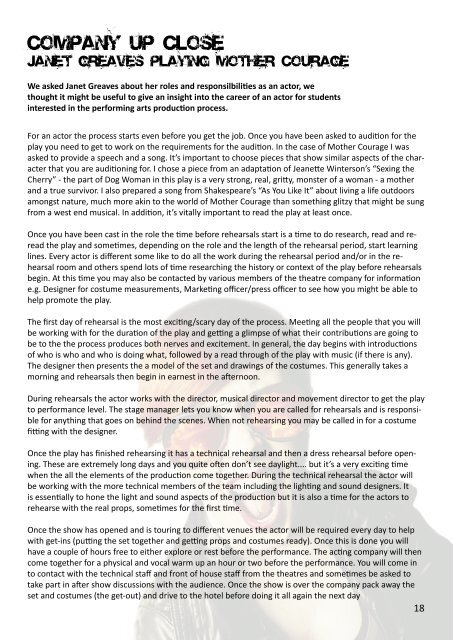Mother Courage Education Pack - Theatre Severn
Mother Courage Education Pack - Theatre Severn
Mother Courage Education Pack - Theatre Severn
You also want an ePaper? Increase the reach of your titles
YUMPU automatically turns print PDFs into web optimized ePapers that Google loves.
We asked Janet Greaves about her roles and responsilbilities as an actor, we<br />
thought it might be useful to give an insight into the career of an actor for students<br />
interested in the performing arts production process.<br />
For an actor the process starts even before you get the job. Once you have been asked to audition for the<br />
play you need to get to work on the requirements for the audition. In the case of <strong>Mother</strong> <strong>Courage</strong> I was<br />
asked to provide a speech and a song. It’s important to choose pieces that show similar aspects of the character<br />
that you are auditioning for. I chose a piece from an adaptation of Jeanette Winterson’s “Sexing the<br />
Cherry” - the part of Dog Woman in this play is a very strong, real, gritty, monster of a woman - a mother<br />
and a true survivor. I also prepared a song from Shakespeare’s “As You Like It” about living a life outdoors<br />
amongst nature, much more akin to the world of <strong>Mother</strong> <strong>Courage</strong> than something glitzy that might be sung<br />
from a west end musical. In addition, it’s vitally important to read the play at least once.<br />
Once you have been cast in the role the time before rehearsals start is a time to do research, read and reread<br />
the play and sometimes, depending on the role and the length of the rehearsal period, start learning<br />
lines. Every actor is different some like to do all the work during the rehearsal period and/or in the rehearsal<br />
room and others spend lots of time researching the history or context of the play before rehearsals<br />
begin. At this time you may also be contacted by various members of the theatre company for information<br />
e.g. Designer for costume measurements, Marketing officer/press officer to see how you might be able to<br />
help promote the play.<br />
The first day of rehearsal is the most exciting/scary day of the process. Meeting all the people that you will<br />
be working with for the duration of the play and getting a glimpse of what their contributions are going to<br />
be to the the process produces both nerves and excitement. In general, the day begins with introductions<br />
of who is who and who is doing what, followed by a read through of the play with music (if there is any).<br />
The designer then presents the a model of the set and drawings of the costumes. This generally takes a<br />
morning and rehearsals then begin in earnest in the afternoon.<br />
During rehearsals the actor works with the director, musical director and movement director to get the play<br />
to performance level. The stage manager lets you know when you are called for rehearsals and is responsible<br />
for anything that goes on behind the scenes. When not rehearsing you may be called in for a costume<br />
fitting with the designer.<br />
Once the play has finished rehearsing it has a technical rehearsal and then a dress rehearsal before opening.<br />
These are extremely long days and you quite often don’t see daylight.... but it’s a very exciting time<br />
when the all the elements of the production come together. During the technical rehearsal the actor will<br />
be working with the more technical members of the team including the lighting and sound designers. It<br />
is essentially to hone the light and sound aspects of the production but it is also a time for the actors to<br />
rehearse with the real props, sometimes for the first time.<br />
Once the show has opened and is touring to different venues the actor will be required every day to help<br />
with get-ins (putting the set together and getting props and costumes ready). Once this is done you will<br />
have a couple of hours free to either explore or rest before the performance. The acting company will then<br />
come together for a physical and vocal warm up an hour or two before the performance. You will come in<br />
to contact with the technical staff and front of house staff from the theatres and sometimes be asked to<br />
take part in after show discussions with the audience. Once the show is over the company pack away the<br />
set and costumes (the get-out) and drive to the hotel before doing it all again the next day<br />
18


